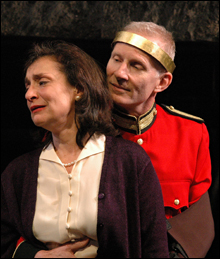
A TENSE MOMENT: Kay and McEleney.
|
Continuing its fascination with power that left off with last fall’s All the King’s Men, Trinity Repertory Company is staging a version of Richard III (through March 2) that comes at us like a Sherman tank.
Directed by Kevin Moriarty, battlefield soldiers outfitted in camouflage wield AK-47s and .45s instead of swords and daggers as this take on the most popular of Shakespeare’s history play pulls the past into the present at gunpoint.
Michael McGarty’s striking set keeps us mindful that such men as Richard have perpetuated the dislocations of war across an unbroken landscape of rubble throughout the centuries. The set is all thrusting platforms of collapsed concrete and steel, tilted this way and that, with shell-blasted blocks of masonry the only places to sit.
This production is relentlessly focused because, like its subject, it has one sole intent. It follows the blazing path of Richard (Brian McEleney) as he arcs like an artillery shell, propelled by his ambition, destroying all on his way to the crown. Like Iago, he not only admits that he’s a villain, but delights in the fact. This interpretation of Richard doesn’t have him brooding in motiveless malignancy. Instead, he is frequently interrupting the action with smirking asides to us as he dupes friends and plots victories. How plausible, how psychologically accurate, for a shrewd man with a dream for power where a conscience should be.
When we hear the familiar opening line of Richard III — “Now is the winter of our discontent, made glorious summer by this sun of York” — Richard is not alone on a London street, where Shakespeare placed him, but rather in the midst of a celebration, tuxedoed with his comrades in arms from the prologue. Ostensibly, he is praising his brother King Edward IV (Johnny Lee Daven¬port), the son of the House of York, whom we have seen him fight with and whom he will scheme to succeed. Most of this introductory soliloquy has him all but rubbing his hands in glee over his villainous plans to do so. But we are not disoriented, because with his finger snap the theater’s house lights come up and we are clued in to this being an interior monologue. The device is used a lot in this production, perhaps gratuitously so, since the same could be accomplished by a conventional and less distracting dimming of the lights.
To Richard duplicity is a game to play, and he plays it well. Appropriately, two of the strongest scenes in this production put that on display. One of the most unlikely decisions in all of Shakespeare is when Lady Anne allows herself to be seduced by Richard, whom she has called “a diffused infection of a man.” He claims to be smitten by her beauty, right after he has killed her husband, whom she devotedly loved. Angela Brazil makes us believe it, though, and the hard way — through the hopeful gullibility we see on her face rather than through dimwitted ego. (McEleney has Richard wet his cheeks with licked fingers when she looks away. Delicious.)
In contrast, Phyllis Kay’s Queen Elizabeth, wife of the deceased Edward IV, his brother, is a fire-eyed match for him. In their confrontation, he has decided that he must now do away with Anne and marry Elizabeth’s daughter, to legitimatize his hold on the throne. In one of the strongest scenes in this production, she unleashes her fury at him even though she knows she must comply, or risk her daughter being murdered, as her two young sons were. “My tongue should to thy ears not name my boys/Till that my nails were anchored in thine eyes” conveys her attitude, and Kay maintains a drumroll of tension.
Other actors provide sturdy support, such as Barbara Meek as Richard’s mother, the Duchess of York; Fred Sullivan Jr. as his main henchman, his cousin and the Duke of Buckingham; and Charlie Hudson III as the Earl of Richmond, who becomes King Henry VII.
This is the first time that Richard III has been presented on the main stage at Trinity, although Amanda Dehnert directed an ingenious version — as a bloody farce, no less — for the 2003 Trinity Summer Shake¬speare Project. Moriarty has lopped off more than 60 minutes, trimming it to a little over 2-1/2 hours, including intermission. That was especially difficult since he inserts a 15-minute prologue to orient us to the characters, drawn from a prior history play.
Well done once again, Trinity Rep. And for a bonus, entirely in mellifluous verse.